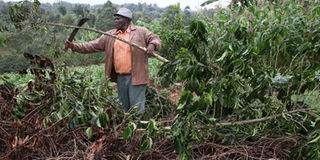Debt, farmers frustrations break coffee factories' backs

A coffee farmer in Mathira East, Nyeri County, uproots his coffee bushes on January 18, 2016 to make firewood. He was disappointed by the dwindling returns. PHOTO | JOSEPH KANYI | NATION MEDIA GROUP
What you need to know:
- In Tetu, Kagumo, Gaaki Central and Thageini factories are on the verge of closing down due to lack of produce.
- Poor payments by cooperatives, high farm input prices and poor management have driven farmers to brokers.
Coffee factories in Mt Kenya region are closing down in what could deal a blow to the industry that employs thousands and earns the country billions in foreign exchange.
Growing debt, mismanagement, low prices and coffee hawking are some of the factors that have led to the closure of the factories, which are a key cog in the sector.
Farmers deliver their produce to the factories, where it is pulped before the produce is taken to cooperatives.
The cooperatives then take the produce to millers, who market and sell it. Cooperative societies comprise several factories.
SALARIES
More than 10 factories have either collapsed or are on the verge of closing down in the region.
The debt-ridden Mathira North Coffee Farmer’s cooperative society in Mathira, Nyeri County, is on its death bed, threatening the livelihoods of thousands of peasant farmers.
Three of its factories have closed down following a mass pullout of farmers, who have cited mismanagement and poor payment, while others have abandoned coffee farming altogether.
When the Nation team visited the factories, it was met by abandoned coffee beans covered with overgrown vegetation and disused pulping machines rotting away.
The Nation learnt that the two factories closed shop last year after workers left for not being paid their six-month salaries.
FINANCES
At Ruiruiru factory, a man who identified himself as Patrick Maina is still clinging to his dear job as a guard though he has not been paid his salary for the last five months.
He says mismanagement by successive committees is to blame for farmers’ woes.
Mr Charles Murage, the interim secretary of an outfit formed by members of Ruiruiru factory to try to revive it, said farmers used to deliver more than 400,000 kilos of cherry per season previously.
This has now dropped to a mere 3,000 kilos. He urged the government to intervene before it is too late.
Last year, the mother cooperative society was reported to be in the red, reeling under a Sh24 million debt owed to local banks, suppliers and workers who have not been paid for the past eight months, the local cooperative officer Peter Njoroge revealed.
BANK ACCOUNTS
According to a former society manager who has since moved to another organisation, and who talked on condition of anonymity, the farmers’ woes started in 2015 when some former members of the management committee abused borrowing power given to them by the growers.
“They ignored our advice and closed all bank accounts that required the authority to withdraw from the local cooperative officer as stipulated in the Cooperative Act and they transferred all the funds to respective factory operation accounts which they controlled directly,” he said.
“We have given up on this cooperative. It might never get back on its feet if there is no immediate intervention,” Mr Mwangi King’echa, a member of Kabiruini factory, said.
The mother society comprises three other factories: Kiamariga, Kahiraini and Hiriga.
It’s annual production was five million kilos of cherry per season, which has dropped to 90,000kg, according to cooperative officials.
COFFEE HAWKING
In an earlier interview, the society's manager Douglas Warutumo, while acknowledging the crisis, claimed that farmers were running away from paying the debt which, he said, had been borrowed by the management to meet operational costs of the society.
In Tetu, Kagumo, Gaaki Central and Thageini factories are on the verge of closing down due to lack of produce.
They are victims of coffee hawking, where farmers sell their produce to brokers who give them instant cash instead of waiting for months when they deliver to factories and cooperatives.
Poor payments by cooperatives, high farm input prices and poor management have driven farmers to brokers.
BROKERS
Speaking to the Nation, Mr John Kamau, a farmer, said the highest he has received from his cooperative is Sh38 for the last three years.
“They have been shifting blame to us but it is them who have failed us. Farm inputs are too expensive for anyone earning Sh38 per kilo of cherry delivered to the factory,” he said.
He added that farmers are paid after almost a year, and their dues subjected to deductions.
In Murang’a, Kangunu, Kiawanduma and Ngutu, factories split from the mother society and are also facing challenges in meeting production and other costs.
TASK FORCE
Last year, members of Kanjahi Coffee Factory in Mathioya stormed the factory and confiscated the processing equipment, demanding the release of their Sh8 million payment.
Mr Simon Wanjohi, the factory’s committee member, said the dispute began when five shareholders wrote to the miller purporting to represent the farmers claiming that they wanted to split from Rwaikamba society.
A task force appointed by President Uhuru Kenyatta to look into the issues recommended term limits for cooperative chairmen.
It also proposed that management of cooperative societies pay farmers 85 per cent of the net earnings.
But its recommendations are yet to be implemented due to ongoing court cases.






